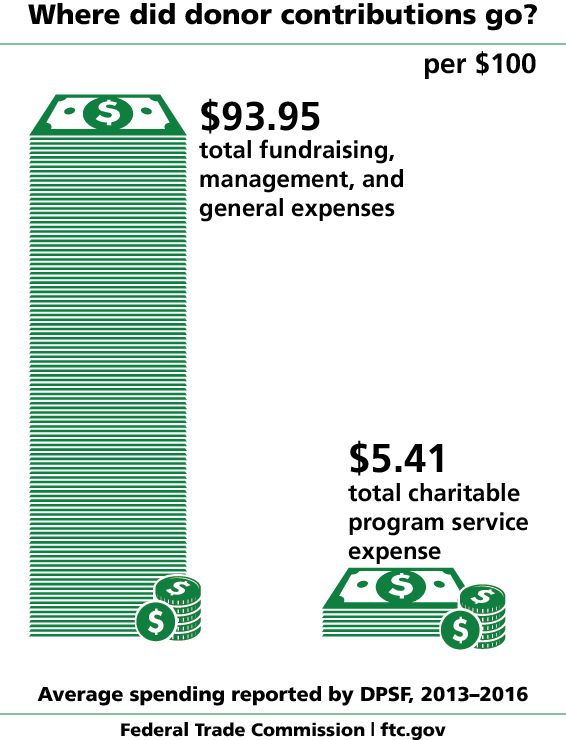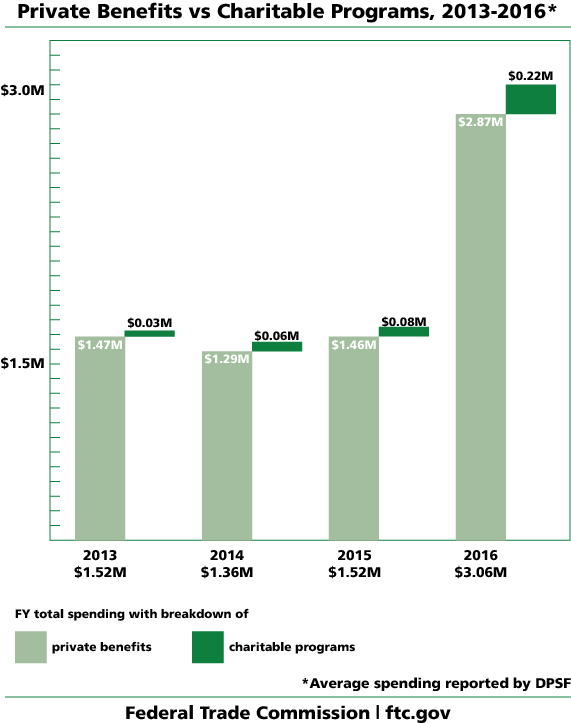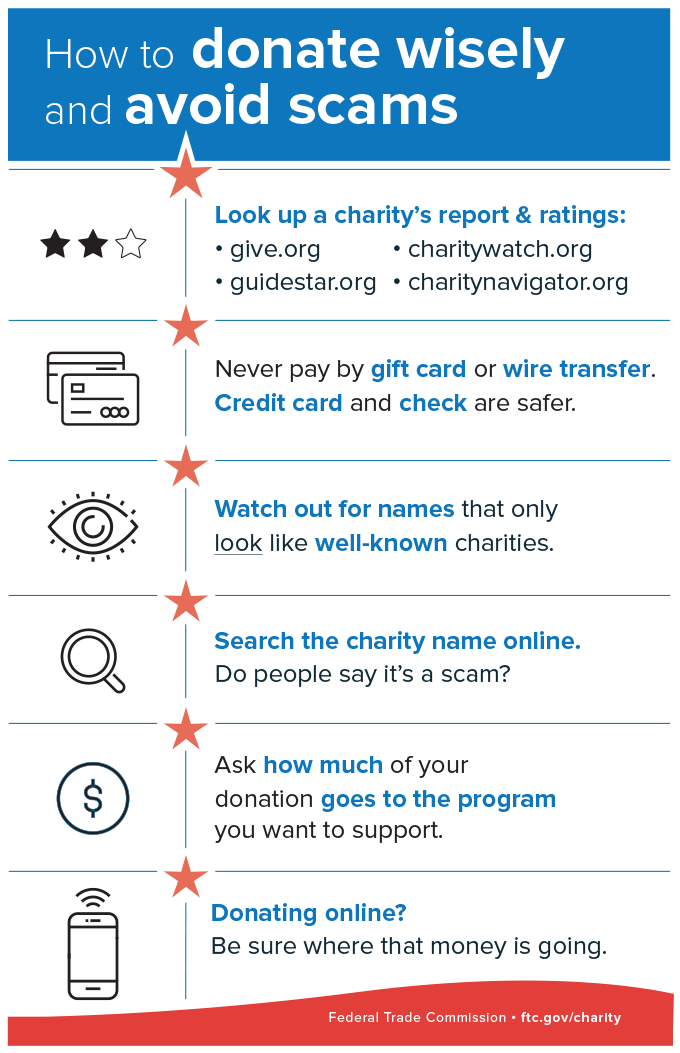Orders ban defendants from soliciting charitable contributions
The operators of two purported sham charities have agreed to settle charges by the Federal Trade Commission and the Attorneys General of Missouri and Florida that they deceived donors with false claims that their organizations helped disabled police officers and military veterans. The operators of both schemes are permanently banned from charitable solicitations or otherwise working for charities.
The settlements with Disabled Police and Sheriffs Foundation, Inc. (DPSF), and American Veterans Foundation, Inc. (AVF), highlight the FTC’s ongoing efforts to stop sham charities from defrauding donors.
“The FTC and state agencies joined forces to stop illegitimate charities that lie to donors about how their generous contributions will be used,” said Andrew Smith, Director of the FTC’s Bureau of Consumer Protection. “You can help—and make sure your donation counts—by checking out a charity before you give. Learn more at ftc.gov/charity.”
Disabled Police and Sheriffs Foundation, Inc.
DPSF (also doing business as The American Police and Sheriffs Association, and Police Officers Safety Association), and its founder and Executive Director David Kenik, are banned from soliciting charitable contributions under a settlement with the FTC and the state of Missouri, for falsely claiming that consumers’ donations would be used to help police officers and families of slain officers, provide life-saving equipment to law enforcement agencies, and provide advanced, specialized training for law enforcement officers and departments.
DPSF solicitations appealed to consumers’ desire to support the law enforcement officers who protect us all. For example, one solicitation explained that:
“We also provide . . . relief to families of officers killed in the line of duty. … Every day officers bravely go out to protect our streets knowing an officer is killed in the line of duty every other day in our country. They are truly real life heroes.” [emphasis in original];
Consumers responded to the calls for help and donated more than $9.9 million to the ostensible charity. In reality, DPSF spent almost nothing helping the families of officers slain in the line of duty, or assisting disabled police and sheriffs.


The defendants are charged with violating the FTC Act, the FTC’s Telemarketing Sales Rule, and Missouri state law.
“Cheating citizens out of money and personally profiting under the guise of helping disabled law enforcement is despicable,” said Eric Schmitt, Missouri Attorney General. “Make no mistake—if you seek to scam or defraud Missouri’s most vulnerable, we will bring you to justice. I’m grateful to have worked with the FTC and their talented team to bring David Kenik to justice and I will continue to fight to ensure Missourians are protected from scams and frauds.”
The Commission vote approving the proposed stipulated final order with the Disabled Police and Sheriffs Foundation, Inc. was 5-0. It was filed in the U.S. District Court for the Eastern District of Missouri on March 27, 2019. The order also imposes a monetary judgment of $9.9 million. All but $100,000 of this amount is suspended due to defendants’ inability to pay. The money paid will go to one or more legitimate charities that actually assist disabled police and sheriffs, as recommended by the state of Missouri and approved by the court.
American Veterans Foundation, Inc.
AVF and its founder and president Paul K. Monville are banned from soliciting charitable contributions under a settlement with the FTC and the state of Florida, for deceptively claiming that consumers’ donations would be used for specific charitable purposes, including care packages for deployed service members, immediate assistance to veterans facing homelessness, and counseling. In reality, the vast majority of consumers’ contributions went to the telemarketers, employee compensation, and other overhead, and almost no money was spent on the programs described to donors.
AVF solicitations preyed on donors’ patriotism and generosity, falsely promising that donations would fund “immediate support” to homeless veterans or veterans facing homelessness “using the full extent of [AVF’s] services.”
When trying to close with a donor who is reluctant to contribute, scripts tell fundraisers to focus on the benefits that donations will support by saying:
We understand, Mr./Mrs. ____, but I’m sure you’d like to help the Foundation in helping to prevent more homelessness among veterans and brighten the days of our American heroes…
The defendants are charged with violating the FTC Act, the FTC’s Telemarketing Sales Rule, and Florida state law.
“This fraudulent charity took in millions of dollars from generous donors who believed the funds would go to active military members and veterans,” said Ashley Moody, Florida Attorney General. “Deceiving donors by exploiting the brave men and women who protect our country is disgraceful. My office will ensure that any recovered money from this sham charity will go to legitimate charities that help our amazing military members.”
Earlier this week, the FTC announced a settlement with another sham charity operation called Veterans of America. The FTC alleged that the defendants used a variety of fake charity names and placed millions of robocalls that tricked consumers into donating vehicles and other valuable property, purportedly to benefit veterans. In reality, none of the proceeds were used for charitable purposes.
The Commission vote approving the proposed stipulated final order with American Veterans Foundation, Inc. was 5-0. It was filed in the U.S. District Court for the Middle District of Florida, Tampa Division, on March 27, 2019. The order imposes a monetary judgment of approximately $6.5 million. All but $105,000 of this amount is suspended because of defendants’ inability to pay. The money paid will go to one or more legitimate charities that actually assist veterans, as recommended by the state of Florida and approved by the court.
NOTE: Stipulated orders have the force of law when approved and signed by the district court judge.
Media Only: An affected consumer will be available to recount his experience with the American Veterans Foundation, Inc. and answer questions upon request. Please contact the FTC press office for requests.
Major Jason Schott, Chief Deputy in the Ste. Genevieve Co. Sheriff’s Office in Missouri, is available to speak to the media. Please contact him directly at 573-880-8029 (cell) or e-mail him at Major@Sgcso.com.
Find data and trends about fraud such as charity scams in your state by going to our Tableau Public website and clicking on your state.

Tips for Consumers and Businesses
Donors and business owners can find information to help them donate wisely and make their donations count at FTC.gov/Charity.
Guidance includes:
For donors:
- Before Giving to a Charity
- Operation Donate with Honor continues
- Donating to help police or other first responders
- Giving to Charities That Help Veterans
- Giving to Organizations That Help Servicemembers and Their Families
- Giving to Organizations That Help Police and Firefighters
- Donating Through an Online Giving Portal
For businesses:
- From hero to zero: “Charities” claimed to help police and vets, but pocketed proceeds
- Tips for Retailers: How to Review Charity Requests
- Business Guidance: Online Charitable Giving Portals
Videos:
The Federal Trade Commission works to promote competition, and protect and educate consumers. You can learn more about consumer topics and file a consumer complaint online or by calling 1-877-FTC-HELP (382-4357). Like the FTC on Facebook, follow us on Twitter, read our blogs, and subscribe to press releases for the latest FTC news and resources.